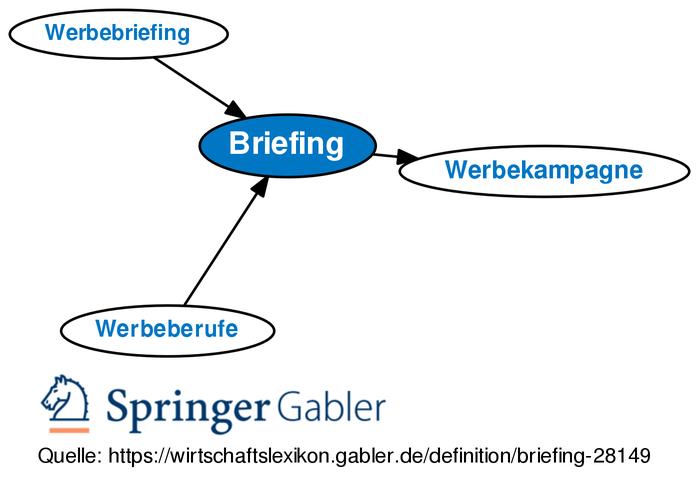divide
tweet
divide
communicate
When working in or with an agency, there is no way around one or the other briefing. In most cases, the briefing is not a foreign word. But what exactly is important briefing content? Which actors are involved in a briefing? What is the role of the ordering company and what is the role of the agency processing the order? The answers to these and other questions as well as a list of briefing content for website and content creation can be found in this article.
We have a small definition for all those who want to deal with the concept of briefing outside of agencies and are newcomers: "Briefing" is an Anglicism and means something like "instruction" or "briefing of the situation". At the same time, "brief" is translated as "short". That's exactly what it gets to the point: It's a brief briefing before the start of a project. However, agencies and their clients should not be fooled by the word "short": A complete, high-quality briefing is the A&O of good cooperation between clients and agencies - because only those who have been properly briefed have all the information they need to complete the order to fulfill satisfactorily.
By the way: Even if you tackle a project alone, you should not do without a briefing. Ask yourself the questions we raise in this article and start your project with a well-founded concept.
Briefing and project management
A detailed briefing is particularly important for a successful project. It's a communication tool, albeit on a non-technical basis. And it should definitely be part of project management. Read this article to find out what else you should know about project management communication and what tools can help.
Starting point: offer
The first contact with a potential customer is often by e-mail, in which agencies are briefly and succinctly asked to submit an offer for a product such as "our new website". Especially here you shouldn't give too much importance to the "brief" part of the briefing - because agencies shouldn't be satisfied with so little. Agencies need to have a clearer idea of what you want through the briefing. It doesn't make sense for the customer to simply offer a website or content with a handful of pages.
If you go into a department store and ask for "what to wear," you won't get any sensible information. You will first be asked by the seller what exactly it may be. So get in touch with your potential client. Of course, this also applies to all other inquiries. Be it requests for the creation of content, press work or or or.
The potential client must therefore be asked exactly what he imagines the desired product or service to be. This is best done in a personal appointment. This gives contractors a sense of the personality, the company and the importance of the project. At the same time, the potential customer gets a feeling for the agency, the team and the value of the time spent.
Are you planning to relaunch your website? In our white paper "Approaching the website relaunch the right way", you can find out what to look out for when redesigning a website and benefit from our tips.
The ideal client
The ideal client follows a strategy and has clear ideas about the product, the goals and the target group, which are communicated to you in a briefing. The customer is open to the solutions that you propose to him in the course of the project, the advantages and disadvantages are objectively considered and the customer and agency ultimately find the optimal solution as a team.
The real client
But rarely do contractors meet ideal customers. Most of the time, the clients already have an idea of what the website or the content etc. should look like. But that means thinking in terms of solutions instead of goals. At this point, the agency and client are still in the process of analyzing the problems and defining the goals, the target group, etc. You will find interesting insights and tips on how to find out your company's target group in this separate article about a successful target group analysis.
So the solution is still a long way away. It is important to dissuade clients from preconceived notions as far as possible in order to be open to new ideas. If the customer does not yet know what he wants, the agency should work out goals for the project as a team with the customer. In this way, the former avoid a lot of trouble with a concept that ultimately does not meet the customer's wishes. Many customers don't know exactly what they want, only what they don't want - when they see it in front of them.
Briefing content: The most important questions for content and website briefings
In any case, agencies should clarify the following points with the potential client in the briefing:
What are the goals of the project?
Who is the target group?
What content needs to be considered (information that needs to be included)?
Are several language versions planned? If yes, which?
Which functions or benefits should the product (website, content, etc.) have?
Is there a corporate design or corporate identity or design and language guidelines?
Were there previous multimedia productions? If so, ask to see them and ask if the client was happy with them.
Are there role models (both positive and deterrent)?
Is there a permanent advertising agency?
How should the product (website, content, etc.) be advertised?

What is the company's unique selling proposition - the "unique selling proposition" (USP), as they say in marketing? (What differentiates the client from its competitors?) Depending on the type of content (and in any case with a website) it is necessary to have this information.
What content is already available (and can be used)?
Which graphics, photos, films etc. are available? Is the quality sufficient and does the customer own the rights to the materials?
Should advertising banners be placed?
Should there be downloadable content?
For a website that is to be designed, the following briefing questions are added:
Already have a domain?
What are the technical framework conditions? Is there a server to run the site on? Should it be integrated into a database or should it access databases?
When is the site scheduled to go online?
How should the website be promoted?
How will the site be maintained and updated?
In addition, the following information should be collected through your own research:
What do the websites of the main competitors look like? Web presence does not just mean the websites, but all channels that are used with content from the competition. Incidentally, it is best to observe the websites of competitors for some time. This can be used, for example, to design detailed content strategies. A good tool for such an observation are social media monitoring tools.
How is the company doing in the market? Is it a niche player, a small challenger or a market leader?
How does the company present itself to the outside world?
How important is the web for the company?
A detailed briefing is important for every project. However, the questions given here relate primarily to the aspects of website and content. Companies can use these briefing questions to prepare for this topic, regardless of whether they are clients or contractors.
The most common problems - and their solution
The expert problem
An agency specializes in its field. She has experts in her field. Therefore, contractors can actually tell the client where to go. This is exactly what agencies should avoid during the briefing. You should back off as much as possible. Because at this stage it is particularly important to get as much information as possible from the client in order to find out what he actually wants.
The customer problem
Almost every client has an idea of what their website and content should look like. However, very few can communicate this idea. But when an agency delivers something that is different from what the client had in mind, problems begin. Contractors should therefore conduct the briefing in such a way that they always hold the reins but let their potential client do the talking. The customer is in the foreground. He should blab out his ideas in as pleasant an atmosphere as possible. With the right questions, the agency gradually gets these out. And be careful: Showing off your own knowledge is the wrong strategy – it tends to frighten you rather than impress you. The active part of the agency comes later, now their employees first of all have to listen.
If the customer has not yet developed his goals exactly, the agency has to offer help. Many companies think that simply being present on the web is enough. In doing so, they may be wasting great opportunities. It is the agency's job to point this out. In addition, she should make it clear to her customers that marketing for the website and content must also be integrated into the strategy and design.
The price problem
The client will often ask about the costs during the first meeting. However, contractors should keep this issue open for as long as possible. Because they can hardly calculate before they know exactly what the project should look like and how much time it should take. In addition, it is important to present yourself as a competent partner who does not impress with a bargain price but with his qualities. Contractors must therefore also make it clear to the customer that he can only win with this approach (first the detailed project description, then the cost calculation). If the price in the offer is too high for the customer, he has always received a first rough description of his project free of charge. It is favorable if the contractor obtains information about the potential client's maximum willingness to pay. Because then he has an idea of the scope within which he can move in terms of price and effort. Another interesting post on this topic: Calculation and Fees.
Record the briefing in writing
Once the customer has formulated his wishes in detail, the briefing takes place in the second round. Namely on the part of the contractor. In the course of this briefing, it must be ensured that all content has been correctly understood. At best, this should be done in writing, for example in the form of an email to the customer. If all this has been taken into account, the briefing is complete and nothing stands in the way of a satisfactory cooperation. In that sense: Happy Briefing!
divide
tweet
divide
communicate
image sources
question-mark-2110767_1920: Pixabay
office-business-meeting-5472251_1920: Pixabay


